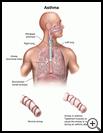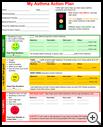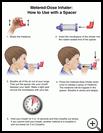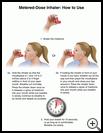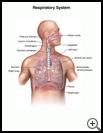
Asthma
What is asthma?
Asthma is a long-lasting (chronic) lung disease. It causes symptoms like coughing, wheezing, and shortness of breath.
Asthma may be mild, moderate, or severe. An asthma attack may last a few minutes or a few days. Attacks can happen anywhere and at any time. Severe asthma attacks can be life threatening. It is very important to get prompt treatment for asthma attacks and to learn to manage your asthma so you can live a healthy, active life.
Asthma is a long-lasting condition, even though you might not have any symptoms every day or even every year. It is more common in children than adults. People who had asthma as children often have no symptoms once they become adults. However, the symptoms may come back later in life. Asthma that develops for the first time in mid- or late life usually keeps being a problem for the rest of your life.
You may find that there are things you used to do that you can no longer do because it is harder to breathe.
Many Americans have asthma, and the number of people who have asthma is increasing worldwide.
What can I expect in the hospital?
Several things may be done while you are in the hospital to monitor, test, and treat your condition. They include:
Monitoring:
- You will be checked often by the hospital staff.
- Your heart rate, blood pressure, and temperature will be checked regularly.
- Your blood oxygen level will be monitored by a sensor that is attached to your finger or earlobe.
Testing:
Testing may include:
- Spirometry: A breathing test measures how well you breathe in and out. You may be tested before and after taking medicine to see how your symptoms respond to medicine.
- X-rays: Pictures of the inside of your lungs to check for an infection or other abnormality
- Arterial blood gas (ABG): A blood test to measure the levels of oxygen and carbon dioxide in your blood
- Sputum culture: A test in which fluid from the lungs is removed and tested to check for infections
- Bronchoscopy: A flexible, lighted tube is passed through your mouth and down into your lung to see abnormal areas. A biopsy may be taken to help make a diagnosis. A biopsy is the removal of a small sample of tissue for testing.
- CT scan: A test that uses X-rays and a computer to find whether you have an infection in your lungs
Treatment:
The treatment for asthma depends on the cause, your symptoms, how well you respond to treatment, your overall health, and any complications you may have.
- You will have a small tube (IV catheter) inserted into a vein in your hand or arm. This will allow for medicine to be given directly into your blood and to give you fluids, if needed.
- You may receive oxygen through a small tube placed under your nose or through a mask placed over your face. In very severe cases, you may need a tube put into your windpipe to help you breathe.
- Your provider may prescribe medicine to:
- Relax your airways and prevent asthma attacks
- Stop asthma symptoms
- Reduce swelling in the airways
- Reduce acid in your stomach
- Your provider may recommend other types of therapy to help relieve pain, other symptoms, or side effects of treatment.
What can I do to help?
- Tell your healthcare team if you have new or worsening:
- Trouble breathing
- Wheezing (a high-pitched whistling sound when you breathe in or out)
- Chest tightness
- Cough
- Ask questions about any medicine, treatment, or information that you do not understand.
How long will I be in the hospital?
How long you stay in the hospital depends on many factors. The average amount of time to stay in the hospital to treat asthma is 3 to 4 days.
Last modified: 2016-07-18
Last reviewed: 2016-07-15

